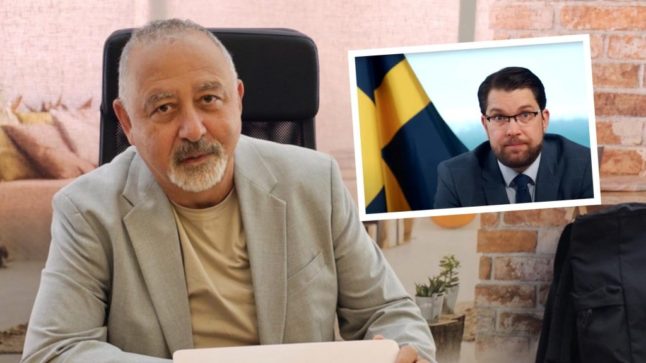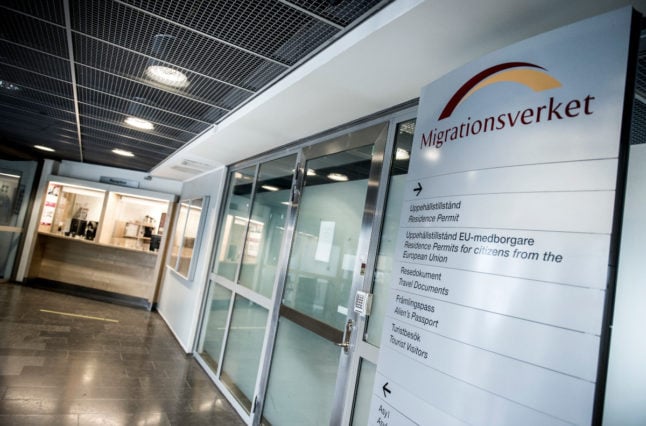The Sweden Democrats have long been renowned for adeptly using social media to deliver a populist discourse that plays with people’s emotions and distorts their minds — and those people are ordinary Swedes, some of whom can be influenced by the party’s message, and particularly by the words of the party’s leader, Jimmie Åkesson.
The latest gimmick is to use artificial intelligence to create the illusion of Åkesson delivering a “speech to the nation” in Arabic.
But this has drawn the attention of Swedes, particularly his supporters on the right, much more than it has been noticed by any of the Arabic speakers in Sweden.
Hours after the publication of Åkesson’s speech, Sweden’s public broadcaster SVT visited the offices of Alkompis to ask us, as an Arabic-speaking Swedish media institution, about the impact of his speech on Arabic speakers and also to ask whether this might be a successful way of reaching other linguistic groups in society.
It is worth pointing out here that Åkesson and his party remain strongly opposed to government agencies publishing information in other languages, and are also pushing to close down the channels in Arabic and other languages at Sweden’s public broadcaster.
Of course, we listened carefully to Åkesson’s speech in Arabic, and we came to several conclusions.
Firstly, Åkesson had nothing new to say in his natural-sounding and fluent Arabic. He delivered the same populist speech that he has already delivered more than once in his native Swedish.
Secondly, it is abundantly clear that while the Arabic may be correct, the speech is directed at Swedish voters. Hardly any of the comments under the speech on social media are in Arabic or written by Arabic speakers.
What Åkesson’s voice is actually saying in this fluent Arabic is: ‘Look at how I can address a group of immigrants in their own language and teach them a lesson about Swedish culture and European values. Look at how I can praise those who have integrated and point my finger at criminals and the unemployed and show them to the exit from our country and our society.’
When Åkesson addresses his listeners in Arabic and tells them ‘you are guests here’, he is undermining the values of cultural pluralism on which modern Sweden was founded. He does not want to acknowledge refugees and immigrants, new or old, as a part of this pluralism, because to him they are merely guests. And this is of course dangerous.
In this speech and in his previous speeches, Åkesson has sought to link crime in Sweden to failed integration and to an overly generous immigration policy, especially in the years between 2014 and 2018. He then follows this with a message attacking everyone who is not ethnically Swedish.
Martin Nordin, an associate professor of economics at Lund University, wrote in a recent article in Aftonbladet that the link Åkesson makes between immigration policy and failed integration is a bit like blaming the rain when your roof is full of holes: is it the rain that causes the mould and the moisture spreading through your house, or the holes in your roof?
It’s the same thing here. The leader of the Sweden Democrats is trying to blame immigrants for all the ailments and failures in society, instead of looking more closely into why people have to live in vulnerable and segregated areas, where the schools are failing and unemployment is blighting the future of young people and pushing them towards crime, where the services provided are declining and poverty increasing.
In this inflammatory speech — in which he distributes praise and blame as if he were the leader in some sort of dictatorship — Åkesson places the blame on previous governments. But now that he has so much control of the government from behind its ministers, he should start to contribute to and develop policies that might help integration succeed instead of creating yet more polarisation.
When Åkesson blames Sweden’s current problems on previous governments, when he says that he was raised in a Sweden that was prosperous and safe, but that in today’s Sweden, he finds it difficult to raise his 10-year-old son, he is contradicting himself.
Because we know that the Sweden in which Åkesson grew up as a child and as young man was in fact relatively free of racism. It was based on strong values of tolerance and equality, social justice and multiculturalism, thanks to the liberal and socialist parties then in power.
So what Åkesson, the adult, is seeking to do is actually overturn the values which were dominant while he was growing up.
Whichever creative person it was that advised Åkesson to record a speech in Arabic, it is certain that they will judge its success first and foremost on how it impacts on Swedish voters and not on its impact on Arabic-speaking immigrants or refugees.
This article has been translated from Arabic. The original Arabic article is available on Alkompis here.



 Please whitelist us to continue reading.
Please whitelist us to continue reading.
Member comments